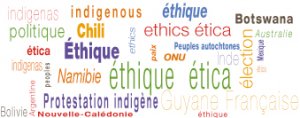

About Us | Key concepts

A propos du mot « autochtone »
Désignant le rapport à la terre (autòkhtônos, « de la terre même »), le sens du mot «autochtone » se confond avec celui de « indigène » construit sur les éléments latins gena et indu « issu de l’intérieur », pour désigner étymologiquement « celui qui est du pays ». Le mot « indigène » distingue les personnes « nées dans un lieu » de celles qui viennent d’ailleurs (advenae). Aux Nations Unies, le terme « autochtone » accolé à « peuple » est la traduction officielle en Français (...)
Droit à l’autodétermination
De la consécration internationale progressive du droit à l’autodétermination En tant que principe politique, le droit des peuples à disposer d’eux mêmes, constitue un pilier des textes révolutionnaires français et nord-américains. Il pose le principe selon lequel chaque peuple dispose d’un choix libre et souverain de déterminer la forme de son régime politique. A l’issue de la première guerre mondiale, le principe est inscrit au sein des 14 points du Président américain Woodrow (...)
Ethical interrogations have long been part of academic research although they have long been limited to the domains of philosophy and medicine. Today however, ethical issues are transversal to the whole sciences and human activities. They are formalized as guidelines and protocols or are enshrined in law. With the development of the Human Rights regime and institutions, every discipline and domain of activity is confronted to the question of how to act in the best possible way.
Ethics in Anthropology
An (...)
The term « governance » has become widely used in political discourse as well as within social sciences although it has no accepted stable definition. Originally a Greek term meaning “to pilot”, translated into Latin it now appears in most European languages. Etymologically and historically, the notion of “governance” has been used since Plato to describe the art to govern a human collective.
While government has been more widely used, the term “governance” has made a spectacular return in the 1990s through the advocates of New Public (...)
Le « peuple » a tout du concept apparemment évident mais qui se révèle, à y regarder de plus près, finalement bien délicat à définir en raison de sa grande polysémie. A minima, on peut considérer que la notion de peuple désigne toujours un groupe d’individus qui forment une unité particulière, dotée de frontières (précises, explicites, ou au contraire vagues, voire implicites) et pensée comme étant porteuse d’une sorte de « supplément d’âme » dépassant les intérêts particuliers des membres qui la composent. Au-delà de cette définition générale, le sens du terme (...)





